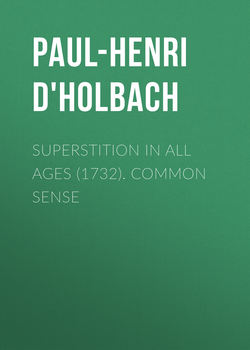Читать книгу Superstition In All Ages (1732). Common Sense - Paul-Henri d'Holbach - Страница 76
COMMON SENSE
LXXIII. – THE FORESIGHT ATTRIBUTED TO GOD, WOULD GIVE TO GUILTY MEN WHOM HE PUNISHES, THE RIGHT TO COMPLAIN OF HIS CRUELTY
ОглавлениеThe faculty of foresight, or the ability to know in advance all which is to happen in the world, is attributed to God. But this foresight can scarcely belong to His glory, nor spare Him the reproaches which men could legitimately heap upon Him. If God had the foresight of the future, did He not foresee the fall of His creatures whom He had destined to happiness? If He resolved in His decrees to allow this fall, there is no doubt that He desired it to take place: otherwise it would not have happened. If the Divine foresight of the sin of His creatures had been necessary or forced, it might be supposed that God was compelled by His justice to punish the guilty; but God, enjoying the faculty of foresight and the power to predestinate everything, would it not depend upon Himself not to impose upon men these cruel laws? Or, at least, could He not have dispensed with creating beings whom He might be compelled to punish and to render unhappy by a subsequent decree? What does it matter whether God destined men to happiness or to misery by a previous decree, the effect of His foresight, or by a subsequent decree, the effect of His justice. Does the arrangement of these decrees change the fate of the miserable? Would they not have the right to complain of a God who, having the power of leaving them in oblivion, brought them forth, although He foresaw very well that His justice would force Him sooner or later to punish them?
